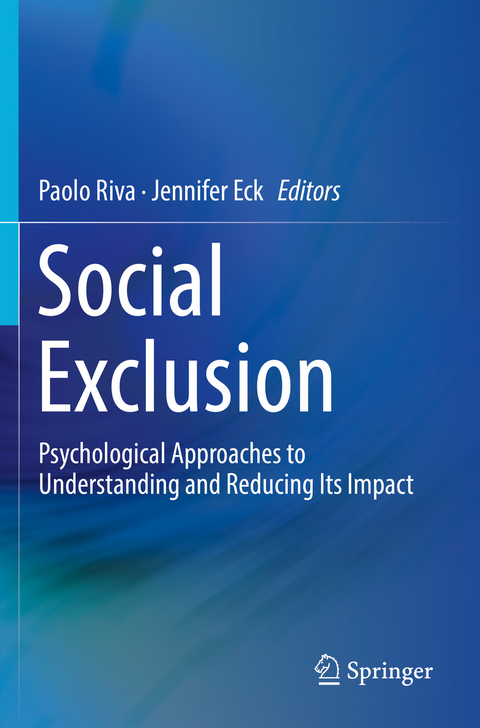
Social Exclusion
Springer International Publishing (Verlag)
978-3-319-93186-9 (ISBN)
From ostracism on the playground to romantic rejection, bullying at work, and social disregard for the aged, individuals are at constant risk of experiencing instances of social exclusion, including ostracism, rejection, dehumanization, and discrimination. These phenomena have a powerful impact as testified by their immediate influence on people's thoughts, emotions, and behaviors. Social Exclusion: Psychological Approaches to Understanding and Reducing Its Impact investigates different psychological approaches, across multiple psychological subdisciplines, to understanding the causes and consequences of social exclusion and possible ways to reduce or buffer against its negative effects.
The purpose of this volume is threefold. First, it lays the groundwork for the understanding of social exclusion research; reviewing the different instances of social exclusion in everyday life and methods to experimentally investigate them. Second, this volume brings together different psychological approaches to the topic of social exclusion. Leading scholars from around the world contribute perspectives from social psychology, social neuroscience, developmental psychology, educational psychology, work and organizational psychology, clinical psychology, and social gerontology to provide a comprehensive overview of social exclusion research in different psychological subdisciplines. Taken together, these chapters are conducive to the important development of new and more integrative research models on social exclusion. Finally, this volume discusses psychological strategies such as emotion regulation, psychological resources, and brain mechanisms that can reduce or buffer against the negative consequences of social exclusion. From school shootings to domestic violence, from cognitive impairment to suicide attempts, the negative impact of social exclusion has been widely documented. Thus, from an applied perspective, knowing potential ways to mitigate the negative effects of social exclusion can have a significant positive influence on people's-and society's-well-being. Overall, this book provides the reader with the knowledge to understand the impact of social exclusion and with tools to address it across many different contexts. Importantly, Social Exclusion: Psychological Approaches to Understanding and Reducing Its Impact aims to bridge the gap between the approaches of different psychological subdisciplines to this topic, working towards a comprehensive, integrative model of social exclusion.
Paolo Riva is a post-doctoral research fellow at University of Milano-Bicocca. His research interests lie broadly in social influence processes with a specific focus on social exclusion. Specifically, he examines the consequences of exclusion and the possible strategies that can buffer against and reduce its effects. In a related vein, he is also interested in the neuromodulation of emotion regulation processes. Jennifer Eck is a post-doctoral research fellow at the University of Mannheim. Her main line of research focuses on social exclusion, with a specific emphasis on psychological strategies that help buffer against the negative impact of social exclusion. Her research interests further include lie detection, the self, and assimilation and contrast.
About the Editors.- Contributors.- Introduction: The Many Faces of Social Exclusion Paolo Riva and Jennifer Eck.- I.Social Exclusion as a Field of Research.- Chapter 1. Social Exclusion in Everyday Life Eric D. Wesselmann, Michelle R. Grzybowski, Diana M. Steakley-Freeman, Eros R. DeSouza, John B. Nezlek, and Kipling D. Williams.- Chapter 2. Methods for Investigating Social Exclusion James H. Wirth.- II. Psychological Approaches to Social Exclusion Chapter 3. Research in Social Psychology: Consequences of Short- and Long-Term Social Exclusion Michael J. Bernstein.- Chapter 4. Research in Social Neuroscience: How Perceived Social Isolation, Ostracism, and Romantic Rejection Affect our BrainStephanie Cacioppo and John T. Cacioppo.- Chapter 5. Research in Developmental Psychology: Social Exclusion among Children and Adolescents Laura Elenbaas and Melanie Killen.- Chapter 6. Research in Educational Psychology: Social Exclusion in School Gary W. Ladd and Becky Kochenderfer-Ladd.- Chapter 7. Research in Work and Organizational Psychology: Social Exclusion in the Workplace Jane O'Reilly and Sara Banki.- Chapter 8. Research in Clinical Psychology: Social Exclusion and Psychological Disorders Klint Fung, Colin Xu, Brianne L. Glazier, Carly A. Parsons, and Lynn E. Alden.- Chapter 9. Research in Social Gerontology: Social Exclusion of Aging Adults Elaine Wethington, Karl Pillemer, and Andrea Principi.- III.Psychological Strategies and Brain Mechanisms to Reduce the Negative Consequences of Social Exclusion.- Chapter 10. Emotion Regulation following Social Exclusion: Psychological and Behavioral Strategies Paolo Riva Chapter 11. Coping with or Buffering against the Negative Impact of Social Exclusion on Basic Needs: A Review of Strategies Jennifer Eck, Christiane Schoel, and Rainer Greifeneder.- Chapter 12. Brain Mechanisms to Regulate Negative Reactions to Social Exclusion David Chester and Paolo Riva.- IV. Final Assessment Chapter 13. Bridging the Gap between Different Psychological Approaches to Understanding and Reducing the Impact of Social Exclusion.- Jennifer Eck and Paolo Riva.- Index.
"As this volume presents research, its primary readership will be those within the research community. But given the vast array of knowledge presented, the work is of paramount importance to any individual with managerial responsibilities related to the design and implementation of meaningful programs to increase inclusion and decrease exclusion in the world. Summing Up: Recommended. Graduate students, faculty, and professionals." (D. Sydiaha, Choice, Vol. 54 (9), May, 2017)
| Erscheinungsdatum | 02.05.2018 |
|---|---|
| Zusatzinfo | XX, 295 p. 6 illus., 3 illus. in color. |
| Verlagsort | Cham |
| Sprache | englisch |
| Maße | 155 x 235 mm |
| Gewicht | 486 g |
| Themenwelt | Geisteswissenschaften ► Psychologie ► Entwicklungspsychologie |
| Geisteswissenschaften ► Psychologie ► Pädagogische Psychologie | |
| Geisteswissenschaften ► Psychologie ► Psychoanalyse / Tiefenpsychologie | |
| Schlagworte | aging and social isolation • buffering social exclusion • discrimination and psychology • emotion regulation process • John T. Cacioppo • negative impact of social exclusion • ostracism and psychology • peer group rejection • psychology of stereotypes • social belonging • social exclusion methodology • social neuroscience and exclusion |
| ISBN-10 | 3-319-93186-5 / 3319931865 |
| ISBN-13 | 978-3-319-93186-9 / 9783319931869 |
| Zustand | Neuware |
| Haben Sie eine Frage zum Produkt? |
aus dem Bereich


